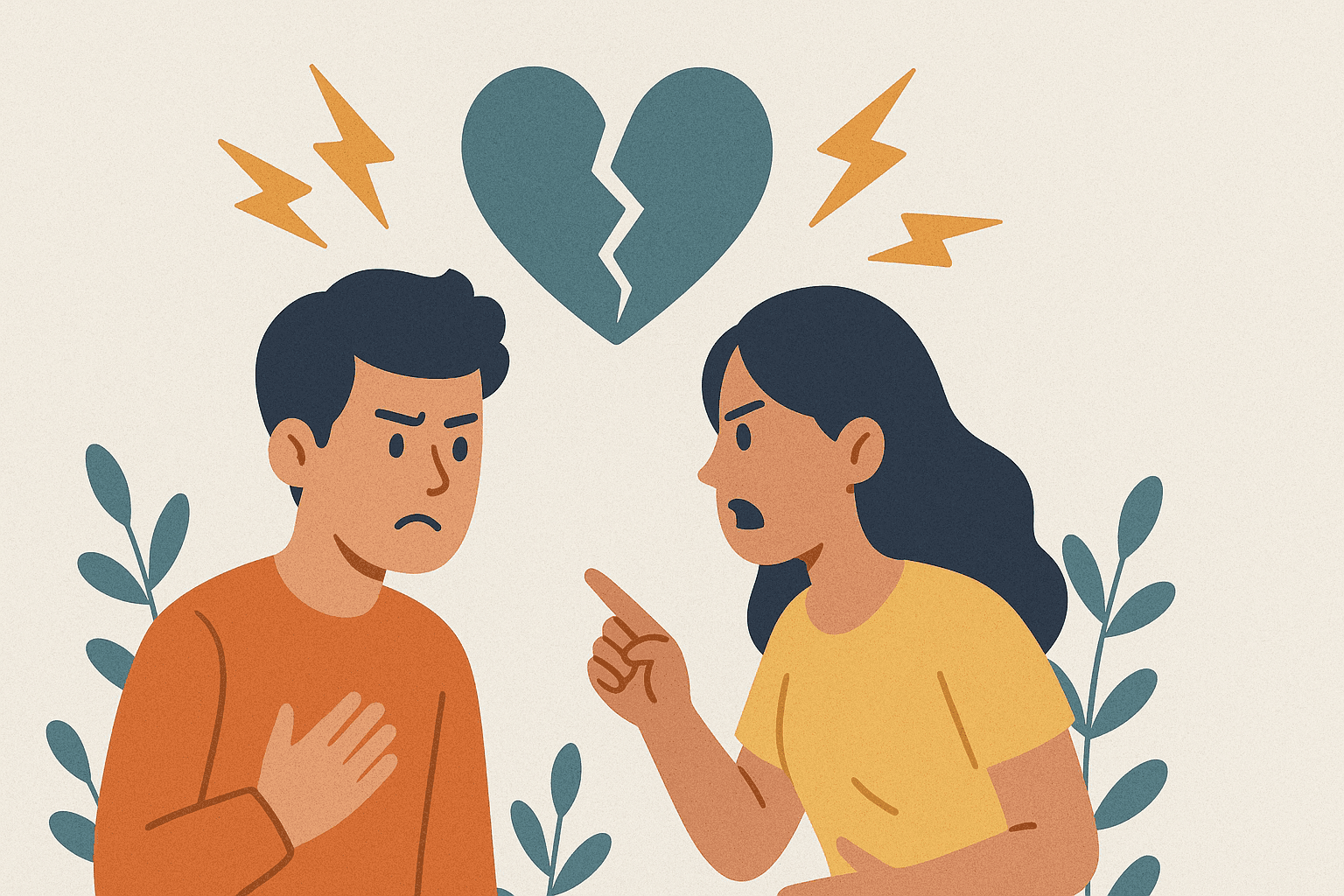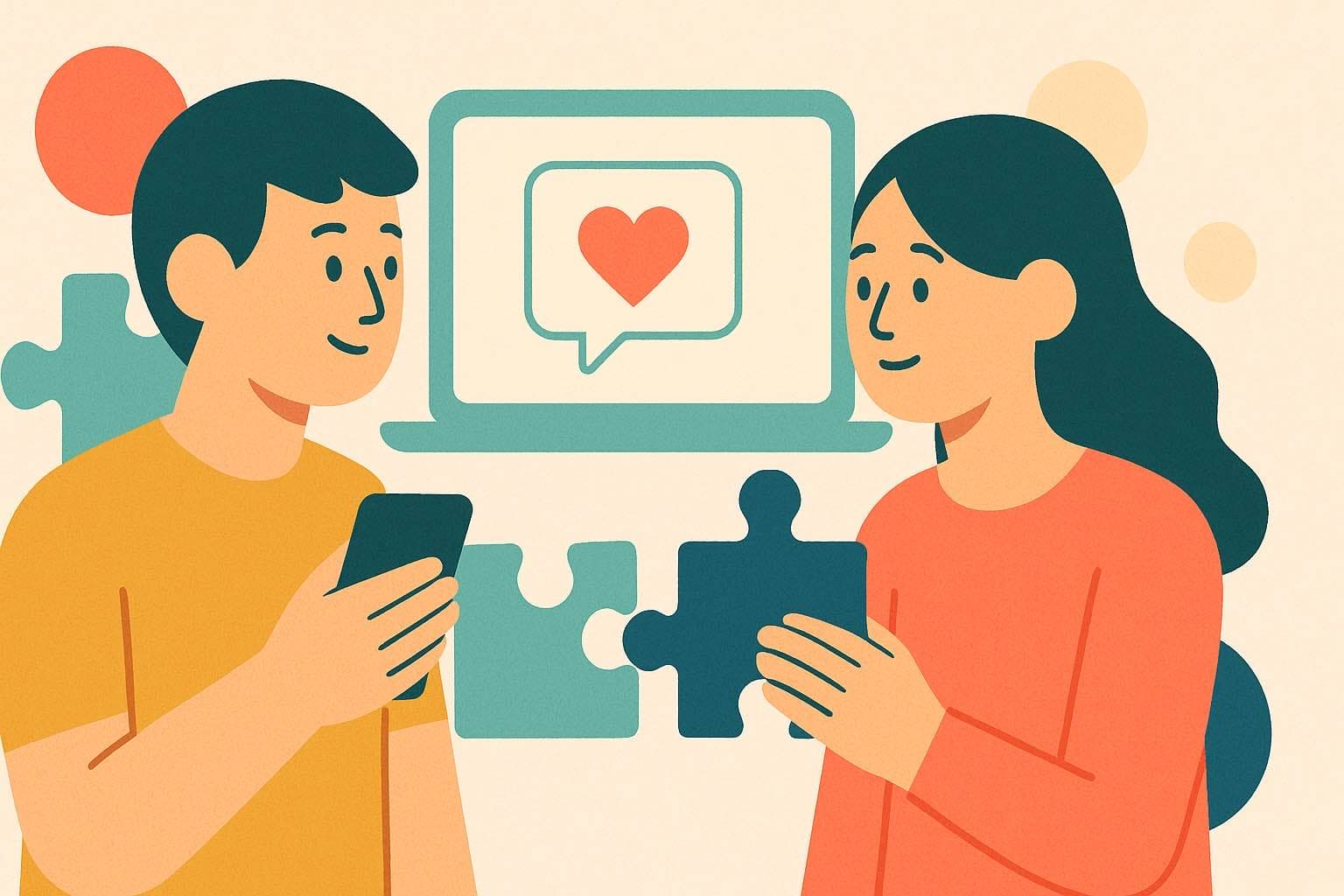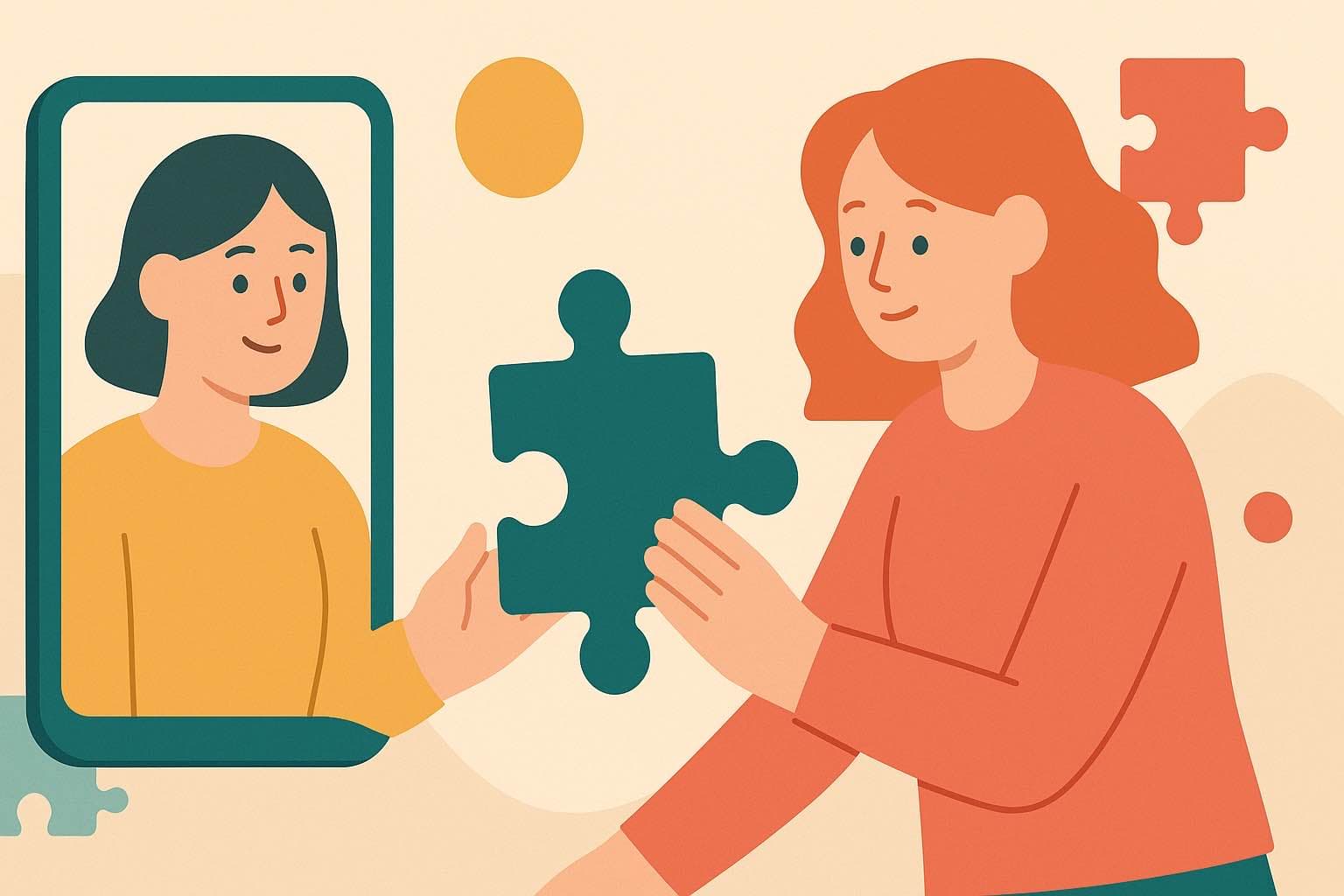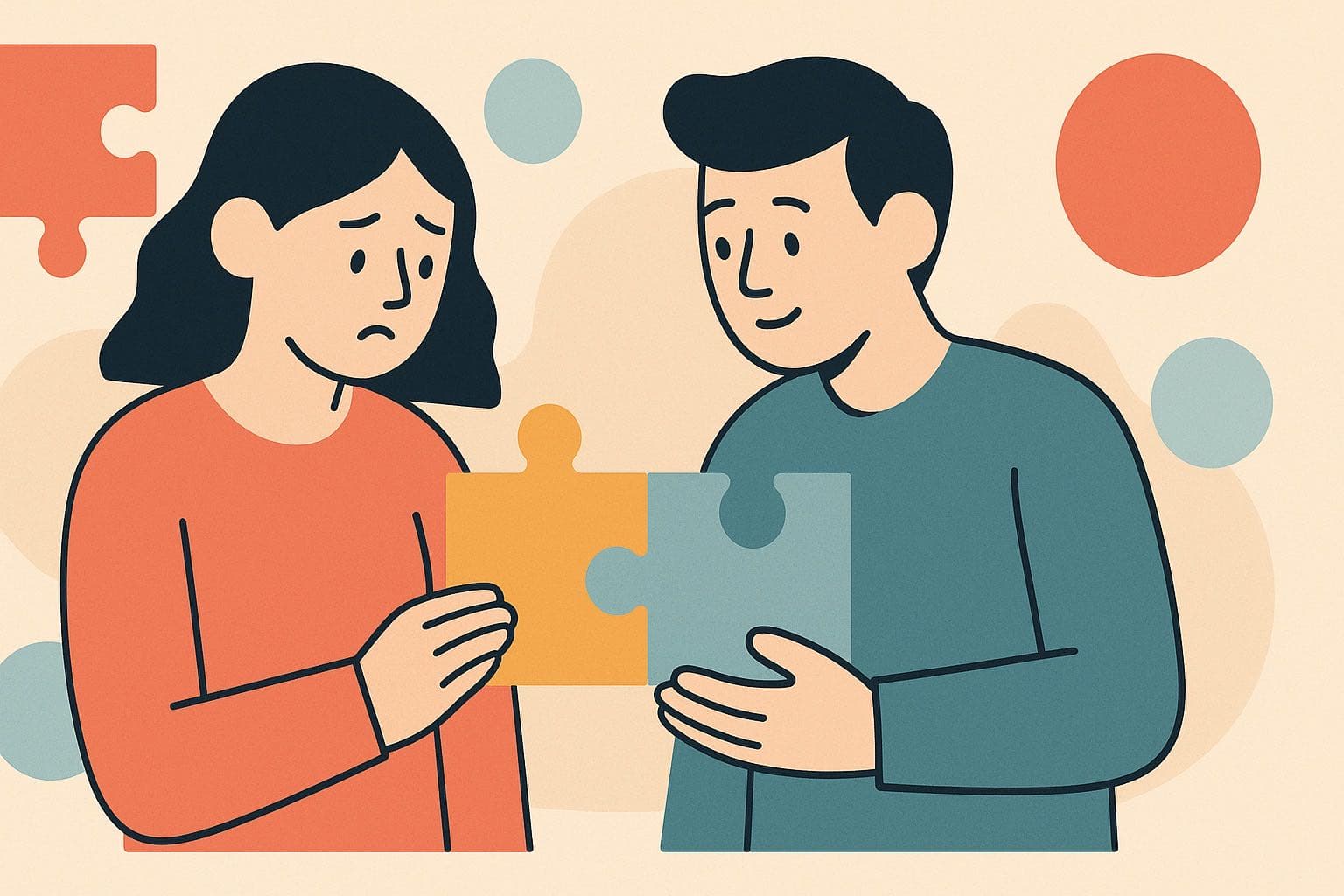7 Proven Friend Conflict Resolution Strategies That Actually Work in 2025
Master friend conflict resolution with expert-backed strategies. Learn communication techniques, boundary setting, and repair methods for stronger friendships.

Friendships bring joy, support, and laughter into our lives. However, even the strongest bonds face challenges.
Friend conflict resolution isn't just about fixing problems—it's about strengthening relationships and building deeper connections. Whether you're dealing with a misunderstanding, hurt feelings, or a major disagreement, learning effective conflict resolution skills can save valuable friendships and prevent future issues.
Understanding Friend Conflict Resolution: Why It Matters
Friend conflict resolution differs significantly from other types of relationship disputes. Unlike romantic partnerships or family ties, friendships are voluntary relationships based on mutual affinity and shared experiences. This unique dynamic requires specific approaches and techniques.
Research from the Utah State University's Confidence Project shows that communication is one of the key factors in strengthening friendships. The study emphasizes that effective communication helps us understand each other better, resolve conflicts, and offer emotional support needed for deeper connections.
The reality is simple: conflicts in friendships are normal and healthy. When we normalize conflicts, instead of avoiding them, we acknowledge that disagreements are bound to happen and that they don't have to be detrimental. Instead, they become opportunities for growth and communication.
What Makes Friend Conflict Resolution Unique
Friend conflicts often involve emotional vulnerability that doesn't exist in professional relationships. The stakes feel both higher and lower simultaneously—higher because we care deeply about these relationships, lower because there's no legal or financial obligation to maintain them.
This paradox creates unique challenges. Friends might avoid addressing issues out of fear that confrontation could end the relationship entirely. However, avoiding them can actually exacerbate problems and create resentment.
Common Causes of Friend Conflicts
Understanding the root causes of friendship disputes helps prevent them and guides resolution strategies. Here are the most frequent triggers:
Mismatched Expectations
Different people have varying ideas about friendship obligations. One person might expect daily communication, while another prefers weekly check-ins. We often project our ideal friendship onto others, overlooking individual differences and needs.
These expectation mismatches manifest in several ways:
- Frequency of contact preferences
- Social gathering inclusion assumptions
- Emotional support availability
- Reciprocity in effort and attention
Communication Style Differences
When people have different communication styles, miscommunications can occur. Some individuals are direct and assertive, while others prefer a passive approach. These differences can lead to:
- Misinterpreted text messages
- Unmet needs for reassurance
- Confusion about boundaries
- Frustration with response times
Life Changes and Evolving Priorities
As we progress through life, our interests, priorities and values may shift, impacting the dynamics of our friendships. Common life transitions that stress friendships include:
- Career changes or demanding jobs
- New romantic relationships
- Parenthood
- Geographic relocations
- Health challenges
Essential Friend Conflict Resolution Strategies
Effective friend conflict resolution requires specific techniques tailored to the unique nature of voluntary relationships. Here are proven strategies that actually work:
Strategy 1: The "Name, Feel, Resolve" Technique
One technique that therapist Chase Cassine, LCSW, recommends for these conversations: "Name the situation, say how you're feeling, and explain how you want to resolve it".
This approach breaks down complex emotional situations into manageable components:
Name the situation: Be specific about what happened without making assumptions about intent.
Say how you're feeling: Use "I" statements to express emotions without blaming.
Explain resolution desires: Clearly state what you need moving forward.
For example: "Last week we had plans to hang out and you canceled. That's happened a few times recently, and I'm feeling hurt. Can we talk about it?"
Strategy 2: Active Listening for Deeper Understanding
Active listening involves paying attention to your friend's words, body language, and emotional tone. When you listen carefully, your friend feels valued and understood, which helps to deepen the trust between you.
True active listening requires:
- Full presence without distractions
- Reflecting back what you've heard
- Asking clarifying questions
- Acknowledging emotions, not just facts
Strategy 3: Managing Emotional Triggers
Before engaging in conflict, people should take some time to calm their emotions and self-reflect. This involves acknowledging and validating our own feelings while practicing self-compassion.
Emotional regulation techniques include:
- Taking breaks when conversations heat up
- Deep breathing exercises
- Identifying personal triggers beforehand
- Practicing self-compassion during difficult moments
Step-by-Step Friend Conflict Resolution Process
Successfully resolving friend conflicts requires a structured approach. Here's a comprehensive process that addresses both emotional and practical aspects:
Phase 1: Pre-Conversation Preparation
Before addressing any conflict, invest time in preparation. Jessie Bohnenkamp, a licensed professional counselor specializing in female anxiety and relationships, advised that to stay as sensible and on-topic as you can, always plan ahead.
Preparation steps include:
- Writing out specific concerns
- Identifying desired outcomes
- Choosing appropriate timing
- Managing your emotional state
Phase 2: Initiating the Conversation
When you want to address an issue, it's never fair to spring it onto anyone. Even if your intentions are positive, addressing a conflict out of the blue without context will only blindside them.
Best practices for starting difficult conversations:
- Request a specific time to talk
- Provide brief context about the topic
- Choose neutral, private locations
- Begin with positive relationship affirmations
Phase 3: Navigating the Discussion
During the actual conversation, focus on collaboration rather than confrontation. Maintain your respect and understanding for the other person by avoiding any negative language or placing blame.
Effective communication techniques:
- Use "I" statements consistently
- Avoid generalizations like "always" or "never"
- Focus on specific behaviors, not character traits
- Listen without preparing your rebuttal
Phase 4: Finding Solutions Together
Conflict resolution is about finding a solution that works for both parties. Once you've communicated openly, listened to each other's perspectives, and found common ground, it's time to brainstorm potential solutions together.
Solution-finding involves:
- Brainstorming multiple options
- Evaluating pros and cons together
- Compromising when necessary
- Creating specific agreements
The Role of Boundaries in Friend Conflict Resolution
Healthy boundaries are essential for preventing and resolving conflicts. Communicating clear boundaries protects your mental and emotional space.
Types of Friendship Boundaries
Time boundaries: How often you communicate and spend time together
Emotional boundaries: What topics and support levels you're comfortable with
Social boundaries: How your friend interacts with other people in your life
Digital boundaries: Response time expectations and social media interactions
Communicating Boundaries Effectively
Boundary conversations require careful attention to tone and timing. Frame boundaries as relationship preservation tools rather than restrictions. For example: "I value our friendship and want to make sure I can be fully present when we talk. I'd like to establish some guidelines about when I'm available for deep conversations."
Rebuilding Trust After Friend Conflict Resolution
Resolving the immediate conflict is just the beginning. Rebuilding trust requires consistent effort from both parties. Resolving a conflict doesn't end with a single conversation. It's important to follow up and follow through on the solutions and agreements that you've reached with your friend.
Trust Rebuilding Strategies
Consistent follow-through: Honor commitments made during resolution conversations
Patience with the process: Understand that trust rebuilds gradually
Open communication: Check in regularly about how the relationship feels
Demonstrating change: Show through actions that you've heard and understood concerns
When Friend Conflict Resolution Fails
Not every friendship can or should be saved. While friendships are valuable, it's important to recognize when a relationship is no longer healthy.
Red Flags That Indicate Relationship Toxicity
- Repeated boundary violations after clear communication
- Inability or unwillingness to take accountability
- Patterns of manipulation or emotional abuse
- Fundamental value misalignments
- Consistent one-sided effort
Healthy Ending Strategies
When conflicts reveal irreconcilable differences, ending friendships gracefully protects everyone's well-being:
- Communicate your decision clearly but kindly
- Avoid blame and character attacks
- Express gratitude for positive aspects of the relationship
- Respect their response, even if it's negative
Digital Age Friend Conflict Resolution
Modern friendships face unique challenges in digital spaces. Text message misunderstandings, social media conflicts, and online communication issues require specialized approaches.
Managing Digital Misunderstandings
Digital communication lacks nonverbal cues, making misunderstandings more likely. When conflicts arise through text or social media:
- Move important conversations to video calls or in-person meetings
- Clarify tone when sending potentially ambiguous messages
- Avoid discussing complex emotional topics through text
- Use voice messages when possible for emotional context
Social Media Conflict Navigation
Public platforms add complexity to friend conflicts. Best practices include:
- Taking disagreements to private messages immediately
- Avoiding passive-aggressive posting
- Understanding that others may witness conflicts
- Considering temporary social media breaks during resolution
Professional Resources for Friend Conflict Resolution
Sometimes friend conflicts require professional guidance. Therapy isn't just for romantic relationships or family issues—friendship counseling can provide valuable tools and perspectives.
When to Seek Professional Help
Consider professional support when:
- Conflicts repeatedly follow the same patterns
- Emotional regulation becomes difficult
- Friend conflicts significantly impact mental health
- Communication attempts consistently fail
Types of Professional Resources
Individual therapy: Helps develop communication skills and emotional regulation
Group therapy: Provides practice with interpersonal skills
Conflict mediation: Neutral third parties facilitate difficult conversations
Communication workshops: Structured learning environments for skill development
Friend Conflict Resolution Across Different Life Stages
Conflict resolution needs and approaches vary across age groups and life circumstances.
Adolescent Friend Conflicts
Teenage friendships involve identity development and peer pressure dynamics. Resolution strategies should account for:
- Emotional intensity and development
- Group dynamics and social hierarchies
- Identity exploration and changing interests
- Limited emotional regulation skills
Adult Friend Conflicts
Adult friendships balance multiple life responsibilities. Common challenges include:
- Time management and competing priorities
- Life stage differences (marriage, parenthood, career)
- Geographic distance and busy schedules
- Established communication patterns that may need updating
Older Adult Friend Conflicts
Later-life friendships often involve health concerns, loss, and changing social circles. Considerations include:
- Health-related limitations on social activities
- Grief and loss processing together
- Different aging experiences and capabilities
- Legacy and meaning-making in relationships
Cultural Considerations in Friend Conflict Resolution
Cultural backgrounds significantly influence conflict styles and resolution preferences. Understanding these differences improves outcomes for diverse friendships.
Direct vs. Indirect Communication Cultures
Some cultures favor direct confrontation, while others prefer indirect approaches. Successful friend conflict resolution requires:
- Understanding your friend's cultural communication style
- Adapting your approach accordingly
- Asking about preferences rather than assuming
- Respecting different comfort levels with conflict
Collectivist vs. Individualist Orientations
Cultural orientation affects how people prioritize group harmony versus individual needs. This impacts:
- Willingness to express personal dissatisfaction
- Importance of maintaining face and avoiding shame
- Role of mutual friends and community in resolution
- Decision-making processes during conflicts
The Mental Health Impact of Friend Conflicts
Unresolved friend conflicts significantly affect mental and emotional well-being. Friendship conflicts can have a profound impact on our emotional well-being. The experience of feeling misunderstood, rejected, or betrayed by someone we care about can be deeply painful.
Common Mental Health Effects
Anxiety and stress: Worry about relationship status and future interactions
Depression symptoms: Feelings of loss, rejection, and social isolation
Self-esteem impacts: Questioning personal worth and relationship skills
Social withdrawal: Avoiding social situations due to conflict stress
Protective Mental Health Strategies
During friend conflicts, prioritize mental health through:
- Maintaining other supportive relationships
- Engaging in self-care activities
- Seeking professional support when needed
- Practicing mindfulness and stress reduction
- Setting realistic expectations for resolution timelines
Prevention: Building Conflict-Resilient Friendships
The best friend conflict resolution strategy is prevention. Building resilient friendships that can weather disagreements requires intentional effort.
Foundation Building Strategies
Clear communication from the start: Establish communication preferences and boundaries early
Regular check-ins: Schedule periodic conversations about the friendship's health
Conflict normalization: Acknowledge that disagreements will happen and that's okay
Shared values identification: Understand core values alignment and differences
Maintenance Practices
Appreciation expression: Regularly communicate gratitude and positive feelings
Growth accommodation: Support each other through life changes and transitions
Boundary respect: Honor stated limits and preferences consistently
Repair skills practice: Use minor disagreements as opportunities to practice resolution skills
Conclusion: Transforming Friend Conflicts into Relationship Strengths
Friend conflict resolution isn't about avoiding disagreements—it's about navigating them skillfully to build stronger, more authentic relationships. The strategies outlined here provide practical tools for addressing conflicts constructively while preserving valuable friendships.
Remember that when conflict is mismanaged, it can cause great harm to a relationship, but when handled in a respectful, positive way, conflict provides an opportunity to strengthen the bond between two people.
Successful friend conflict resolution requires patience, empathy, and commitment from both parties. Not every friendship will survive every conflict, and that's okay. The goal isn't to save every relationship at any cost, but to approach conflicts with integrity, respect, and genuine care for each other's well-being.
By developing these skills, you'll not only resolve current conflicts more effectively but also build the foundation for deeper, more resilient friendships in the future. The investment in friend conflict resolution skills pays dividends across all areas of life, improving communication, emotional intelligence, and relationship satisfaction.
Frequently Asked Questions About Friend Conflict Resolution
How long should I wait before addressing a friend conflict?
Address conflicts as soon as you've processed your emotions enough to communicate calmly. This typically means waiting at least 24 hours after the triggering incident but not longer than a week to prevent resentment from building.
What if my friend refuses to discuss the conflict?
Respect their boundary while expressing your needs clearly. You might say, "I understand you need space right now. I'd like to resolve this when you're ready. Can we check in about it next week?"
Should I involve mutual friends in our conflict?
Generally, avoid bringing mutual friends into conflicts unless you're seeking mediation. Involving others can create additional complications and damage multiple relationships.
How do I know if a friendship is worth saving after a conflict?
Consider the overall relationship history, patterns of respect and care, willingness to work on issues, and whether core values align. If the friendship consistently drains your energy or involves repeated boundary violations, it may be time to step back.
Can friend conflicts actually strengthen relationships?
Yes, successfully navigated conflicts often lead to deeper understanding, better communication, and stronger trust. Conflicts reveal important information about needs, boundaries, and values that can improve the relationship.
What's the difference between friend conflict resolution and romantic relationship conflict resolution?
Friend conflicts often have lower stakes but require more voluntary commitment since there are no legal or financial ties binding the relationship. Friend conflicts also typically involve less daily interaction and different intimacy levels, affecting resolution approaches.
Related Articles

Digital Tools for Friendship Restoration for Teens and College Students: 7 Apps That Actually Work
Discover 7 powerful digital tools that help teens and college students repair broken friendships. From AI coaches to structured conversations, learn how to fix friendships fast.

Digital Tools for Friendship Restoration: How to Blend Online and Offline Repair
Discover proven digital tools and strategies to restore damaged friendships. Learn how to combine online platforms with offline actions for meaningful reconciliation.

Conflict with a Friend? Here's the Step-by-Step Fix
Learn how to fix a friendship after conflict with proven communication strategies, emotional repair techniques, and actionable steps to rebuild trust.

How to Survive a Friend Breakup When You Share the Same Friend Group (Without Losing Your Mind)
Friend breakups hurt worse when you share the same social circle. Learn proven strategies to heal, set boundaries, and navigate awkward group dynamics without losing yourself.